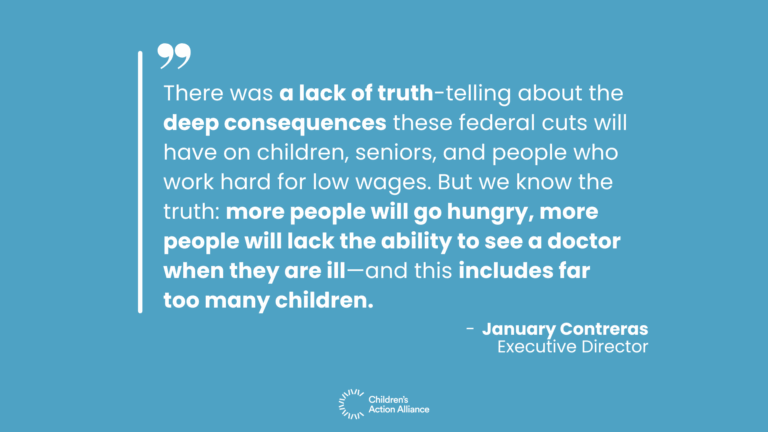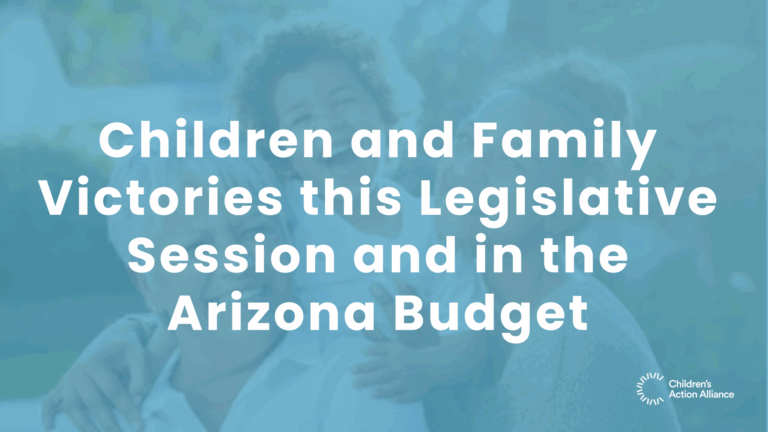
State budget has small key wins for AZ children & families, BUT more needs to be done
Children's Action Alliance's annual legislative agenda is designed to assure the necessary community conditions exist so all Arizona families have equitable access to high-quality education, health care, child well-being, services, and economic opportunities. Our agenda is advanced through funding in the 2023-2024 state budget. Last week, Governor Hobbs passed and signed the budget, and there were some small but key wins for Arizona children and families including:
- KidsCare Program Expansion: The budget expands KidsCare eligibility within Arizona Health Care Cost Containment System (AHCCCS) to 225% of the federal poverty level, providing healthcare to an additional 12,000 children. Children's Action Alliance advocated for a higher threshold of 300% of the federal poverty level.
- Strong Families AZ Home Visiting System: The budget allocates $2.5 million to support the Nurse-Family Partnership in the Strong Families AZ Home Visiting System.
- Reducing financial barriers for youth attempting to exit the Juvenile Justice System: The budget allocates $250,000 to offset the loss of revenue from the elimination of some fees and fines that often create financial barriers for young adults.
- Positive Parenting Program Pilot: The budget establishes a pilot program for the Positive Parenting Program, focusing on post-permanency placements.
- Emergency Shelter and Transitional Living: Funding is increased to provide better emergency shelter and transitional living options for children and youth in foster care.
While acknowledging the importance of these investments, more is needed to determine how these programs will be implemented. And much more is needed to allow all Arizona families to thrive.
These are Children’s Action Alliance’s legislative priorities that still need to be addressed:
Early Childhood
- State investment to increase child care provider reimbursement rates.
- Increased access to high-quality early learning settings such as Head Start, child care, and preschool.
- Expansion of mental and behavioral health support in care and education programs.
Children and Family Health
- Comprehensive dental care for adults covered by Medicaid.
- Streamlined enrollment and uninterrupted AHCCCS coverage for children.
- Extended AHCCCS eligibility for non-citizen children and pregnant individuals.
Child Welfare
- Establish a coordinated and collaborative statewide effort to review and reform Arizona’s mandated reporting system.
- Ensure foster children placed with kin receive the same level of support as they would get in a community foster home.
- Increased access to services for kinship families not formally involved in the child welfare system.
Concerns Surrounding the Budget
Children's Action Alliance has some concerns about the recently passed budget, considering the crucial need for increased investments in Arizona's children and families. One major concern is the potential shortfall in actual state revenues or higher-than-projected expenditures.
The budget relies on a small ending balance that could quickly diminish. The projected ending balance for fiscal year 2024 is $7.8 million – less than 1% of projected revenue. Should revenues fall short of projections, it is very likely the budget will become unbalanced. While $1.4 billion is available in the Rainy-Day Fund, those dollars would provide a one-time solution. If it is determined that ongoing spending exceeds ongoing revenue, the legislature would have two choices: (1) Permanent cuts to spending or (2) Permanent increases to revenue.
The budget fails to adopt any controls on the growth of the Universal Empowerment Scholarship Account (ESA) Program. In the eight months since applications for universal ESAs opened up, enrollment in the ESA program (including the categories that previously existed) has grown from 13,200 to 56,134 students as of May 15, increasing by nearly 1,000 in one week. Enrollment is expected to increase as the new school year approaches. The cost to the state’s General Fund depends not only on the number of ESA students but also on whether those students had previously been enrolled in a public school (and therefore at least partially funded through the state’s General Fund). The absence of a cap or any other limiting criteria, such as an income limit, means participation in the ESA program could far exceed available funding. Learn more about ESAs here: https://azeconcenter.org/arizona-school-vouchers-explained/
The budget provides only one-time funding for issues that appear to be ongoing. The budget process requires the legislature to identify projected ongoing revenues and expenditures for the two years following the year being appropriated. One-time expenditures are not included. While capital projects, highway construction, and repairs are clearly one-time expenditures, other spending that has been categorized as one-time appears to really be ongoing. This includes $12 million in the Department of Child Safety to replace federal and other funds that will no longer be available and $60 million in the Department of Corrections for increased contract costs. While the Statement of Revenues and Expenditures reports more than $700 million remaining at the end of the fiscal year 2026, that number would shrink if even a portion of the nearly $3 billion identified as one-time expenditures for the fiscal year 2024 is actually ongoing.



